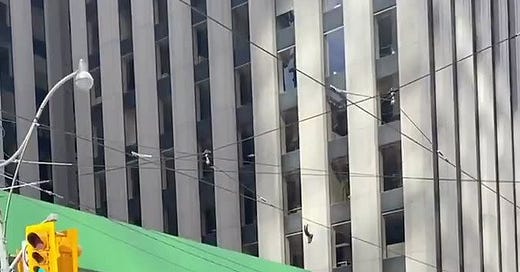I'm seeing a lot of conversations around #EndSARS. What should I know as a Canadian?
A primer on the ongoing violence against civilians in Nigeria and what the diaspora has to say.
Hey there, and welcome to the third issue of The Supplement, a newsletter that fills in the gaps of your other news intake. This is Alex, one-third of the Supplement team!
Each week, we pick a question submitted by you, our readers. If you’d like to submit a question for a future week — it can seriously be about anything — then email us at thesupplementnewsletter@gmail.com.

This week, we’re tackling this question: I'm seeing a lot of conversations around #EndSARS on my social media. Why are my Canadian friends posting about this?
TL;DR:
Nigeria has disbanded its infamous Special Anti-Robbery Squad after years of campaigning by citizens. But Nigerians and the diaspora remain distrustful due to the country’s history of failed police reforms. The movement has grown to challenge not only police brutality but also corruption and social injustice — all issues that resonate in Canada and around the world.
Here’s our answer:
First, what exactly is SARS? Nigeria’s Special Anti-Robbery Squad (SARS) was formed in 1992 to address violent crimes, but the police unit has since been accused of abusing, torturing and killing citizens. As a covert unit, SARS officers were allowed to dress in plain clothes.
Nigerians have long called for the unit to be disbanded, including through the #EndSARS campaign, which has been around since 2017.
What’s happening now? In early October, SARS officers were allegedly caught on video shooting a young man before driving away in his own car. The video went viral, prompting a protest on October 8. Since then, young Nigerians have held large #EndSARS demonstrations throughout the country.
“Such abuses will only be prevented when SARS officers are held to account for their actions and face disciplinary or criminal punishment if they are found to be responsible for human rights violations,” explained Osai Ojigho, director of Amnesty International Nigeria.

As of October 11, the Nigerian government has disbanded SARS, creating a Special Weapons and Tactics (SWAT) team to take its place. But given the government’s previous unsuccessful attempts at reforming SARS, citizens remain distrustful about the promises of police reform. They quickly launched an #endSWAT hashtag to oppose the new unit and continue pushing for substantive changes.
Despite the government’s promises of change and the protests’ peaceful nature, security forces have responded with tear gas, water cannons and live rounds. Most recently, on October 20, the Nigerian military allegedly fired at protestors who were staging a sit-in at the Lekki Toll gate in Lagos, the country’s biggest city and commercial hub. The shooting injured hundreds and killed at least 12 demonstrators, according to Amnesty International. The human rights group also estimated that as of October 21, at least 56 people have died since the protests started.

The movement has spurred solidarity rallies worldwide.
In Canada, where there is a fast-growing Nigerian diaspora, there have been #EndSARS protests in cities including Toronto and Vancouver. For a more intimate look at the movement, Toronto Star reporter Angelyn Francis documented 12 Nigerian Canadians’ perspectives on #EndSARS. And while the movement is specific to Nigeria, they note police brutality is a global issue.
“We’ve realized now more than ever that we are powerful, united and our voices can make an impact. I’m extremely proud that the protests have largely sustained my women. This movement has ignited bigger conversations around government accountability, corruption and the democracy of Nigeria,” Bola Rahman, a human resources professional and filmmaker, told the Toronto Star.

Here’s someone to follow:
Each week, we’ll also be spotlighting a journalist or writer you should be following to help expand your knowledge. In addition to her coverage of #EndSARS, Toronto Star reporter Angelyn Francis has been a consistent voice on the issues of police brutality and racial inequity in Canada.
Here’s a story to read:
We know this makes two Globe and Mail recommendations in a row — but this deep dive into how the prison system is systematically biased against Black and Indigenous inmates is stunning. For a behind-the-scenes look at the story, join us in nerding out about journalist Tom Cardoso’s reporting process and methodology in dissecting the massive data set behind this investigation.
And this morning’s live Q&A about the story with Tom is available for viewing and incredibly interesting.





